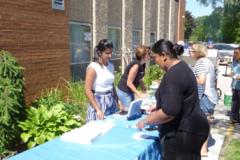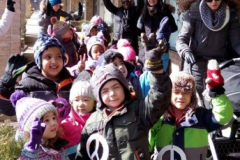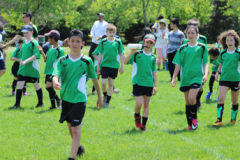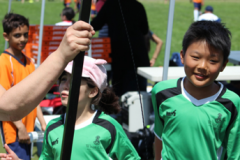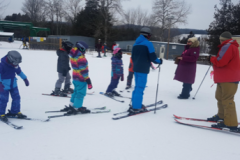CASA
The CASA Preschool Curriculum
Please view our Casa Programme Video
White Oaks’ programme of learning is structured so that the equipment our children use and the activities our children engage in help them develop concentration, coordination and working habits necessary for the more advanced exercises they will perform at later stages in their development.
Faster paced than our Toddler nursery daycare, our preschool serving the Toronto area from Mississauga encourages the children to learn to work quietly and intently on their own tasks. They are encouraged to use the material with a sense of perfection and order. They are encouraged to develop concentration and self discipline.
Our Montessori environment or “Prepared Environment” contains Montessori-approved equipment and materials that are graded to suit the needs of the child. Get in touch!
Casa Subjects
| Practical Life Exercises |
Sensorial Materials |
Exercises in hygiene.
Dressing
Care of Clothing.
Carrying & handling of the many Montessori materials
Using floor mats.
Tidying away work.
Looking after classroom pets and plants.
Taking care of books.
Preparing snacks.
| Exercises which are designed to teach the child how to: |
| Ask for something |
Welcome visitors |
| Wait one’s turn |
Work cooperatively |
| Offer refreshments |
Introduce oneself |
| Walk with a partner |
Offer help to others |
| Behave at the table |
Make eye contact |
| Behave in public places |
Shake hands |
| Exercises for the development of fine and gross motor skills: |
| Rolling mats |
Sweeping |
| Pouring liquids |
Carrying chairs |
| Threading |
Walking carefully |
Cutting
Spooning |
Carrying large materials |
| |
|
|
Visual Sense
Children learn to discriminate by size, length, dimension, colour, similarity and difference.Tactile Sense
Children learn to discriminate by touch. They match sandpaper and fabric of varying textures according to their similarities. They classify material from rough to smooth and learn to contrast and compare.Auditory Sense
Children continue the process of matching, classifying, contrasting and comparing this time using various sounds, musical bells and instruments.Complex Senses (weight, heat, shape, smell, taste)
Children explore all of the above qualities by using carefully designed materials and exercises which sharpen their senses at a time when they have a particular developmental interest in this work (sensitive period).The sensorial exercises are designed to prepare the child for more complex learning in Language, Math and Culture Studies. |
| Language |
Math |
| Oral Expression & Listening Skills: |
| Rhyming words |
Story telling |
| Nonsense words |
Singing games |
| Opposites |
Poetry |
| Animal families |
Role playing |
| Nursery rhymes |
|
| Written Language (starting at age 4): |
| Pencil control |
Phonetic blending |
| Letter formation |
Word & picture matching |
| Sound & letter recognition |
Sentence construction |
| |
|
|
Number value
Number sequence
Number symbol (1 to 1,000)
The 4 basic math operations
Odd versus even numbers
Skip counting (in early preparation for memorization of number facts).
Reading and recording numbers for all of the above activities. |
| Culture |
|
| Earth Science: |
| Solar system |
Parts of the earth |
| Rocks |
Volcanoes |
| Climate |
Environment |
| Lifestyle |
Weather observations |
| Geography: |
| Oceans & seas |
Maps |
| Provinces & territories |
Globe |
| Land & water forms |
Continents & countries |
| History: |
| Calendar |
Days of the week |
| Months of the year |
Seasons |
| Clock, timelines |
Holidays |
| Life Science: |
| Living/non-living |
Plants & animals |
| Vertebrates |
Invertebrates |
| Physical Science: |
| How to observe things |
Classification |
| Simple science experiments |
|
| |
|
|
|
|

